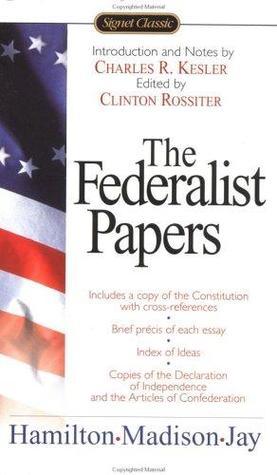The Federalist Papers by Alexander Hamilton, James Madison, John Jay, Philo-Publius Book Summary
Discover a comprehensive summary and key insights of The Federalist Papers by Alexander Hamilton, James Madison, and John Jay. Explore the essential arguments that shaped American democracy and gain a deeper understanding of this influential work. Read our detailed review now!
The Federalist Papers Book Summary
The Federalist Papers represent one of America's most influential political documents, written by Alexander Hamilton, James Madison, and John Jay under the pseudonym Philo-Publius to defend the proposed Constitution. These 85 essays masterfully argue for ratification while addressing critics' concerns about federal power, individual rights, and governmental structure. More than historical artifacts, these papers remain essential reading for understanding American democracy's philosophical foundations and the delicate balance between federal authority and state sovereignty that continues to shape political discourse today.
Enhance your reading journey with our comprehensive Middlemarch Book Summary, Review & Key Insights, offering deep analysis and key takeaways to enrich your understanding of this classic novel.
The Federalist Papers by Alexander Hamilton, James Madison, John Jay, Philo-Publius - Introduction
You know what totally caught me off guard while reading The Federalist Papers? That these essays, written over 200 years ago, still feel incredibly relevant today—especially the idea that a large, diverse republic could actually be more stable than a small one. Honestly, I always thought smaller governments were easier to manage, but Hamilton, Madison, and Jay flipped that on its head in a way that made me rethink how we view political power and unity.
I picked up this classic initially because I wanted to understand the foundation of American politics beyond just the headlines and soundbites. Plus, it’s a cornerstone in history, political science, and law, so I figured it would give me a deeper context about the Constitution and why the framers made certain choices. It’s a hefty read—688 pages—so I wasn’t sure if I’d get through it, but the insights kept pulling me back.
If you’re someone who’s curious about how ideas shape governments or if you just want to get a grip on the philosophy and political theory behind the United States, this book is gold. It’s perfect for anyone who loves history, nonfiction, or classics and wants to see the real debates that shaped a nation.
So, if you want to dive into something that’s part reference, part mind-opener, and totally worth your time, this is it. Trust me, you’ll come away seeing politics—and maybe even the world—a little differently.
What is The Federalist Papers About?

The Federalist Papers, authored by Alexander Hamilton, James Madison, and John Jay under the pseudonym Philo-Publius, are a collection of essays advocating for the ratification of the United States Constitution. The main message emphasizes the necessity of a strong central government to maintain order and protect individual liberties. Key concepts include the importance of checks and balances to prevent tyranny, the benefits of a unified republic over a confederation, and the role of a strong federal government in managing economic and social issues, ultimately ensuring the nation's stability and prosperity.
About Book Author - Alexander Hamilton, James Madison, John Jay, Philo-Publius
Tonight, we have the distinct pleasure of hearing from the minds behind a cornerstone of American political thought. Alexander Hamilton, James Madison, and John Jay, writing under the collective name Philo-Publius, didn't just stumble upon the ideas in The Federalist Papers.
- Their journey to this work was forged in the crucible of a nation's birth, driven by the urgent need to persuade a skeptical New York to adopt a new framework for governance after the Articles of Confederation proved inadequate.
What's interesting about Alexander Hamilton, James Madison, and John Jay is how their diverse paths converged for this monumental task.
- Hamilton, an immigrant with an unyielding drive, had already penned influential pamphlets like The Farmer Refuted.
- Madison, a meticulous scholar, had immersed himself in the study of republics long before becoming a principal architect of the Constitution itself—his detailed notes from the Convention are invaluable.
- Jay, with his sharp legal mind and experience in foreign affairs, having negotiated the Treaty of Paris, brought a crucial perspective, even contributing vital essays on foreign dangers while recovering from an injury.
They weren't just theorists; they were architects. Having debated, drafted, and defended the Constitution, their insights weren't academic; they were born from the very struggle for union and a desire to see their vision for a stable, energetic government realized. This direct experience made them uniquely positioned to articulate its defense.
More Books To Find
The Federalist Papers - Book Overview
The Federalist Papers is essentially a collection of essays that argue for the ratification of the U.S. Constitution. Think of it like a group of friends passionately discussing why they should start a new club and how to make it work. The authors—primarily Hamilton, Madison, and Jay—wanted to convince the states that a stronger central government was necessary to maintain order and protect individual liberties.
Why they wrote it: Beyond just advocating for the Constitution, they were genuinely concerned about the chaos that could arise from too much state power. It was about creating a balance—like a seesaw—where neither side could tip too far without the other pushing back.
What sets it apart: Unlike other political writings, these essays delve deep into the psychology of governance. They don’t just throw out ideas; they dissect human nature and how it plays into politics, making it feel more like a conversation than just a dry textbook.
One example: There's a part where Hamilton talks about how factions—like political parties—can be dangerous. He compares them to a fire: while a small fire can be managed, a raging inferno can destroy everything. This stuck with me because it feels so relevant today, showing how the authors were really thinking about the long-term consequences of their ideas.
Key Insights of The Federalist Papers
The Federalist Papers provide crucial insights into the philosophy and rationale behind the U.S. Constitution.
1. Importance of a Strong Central Government: The authors argue that a robust federal government is essential for maintaining order and preventing chaos. They emphasize that a weak government could lead to anarchy and the inability to address collective issues.
2. Separation of Powers: The papers advocate for a system of checks and balances among the three branches of government—executive, legislative, and judicial. This structure is designed to prevent any single branch from becoming too powerful, thereby protecting individual liberties.
3. Federalism: The concept of federalism is central to the arguments, promoting a balance of power between the national and state governments. This dual system allows for local governance while ensuring that national interests are upheld, fostering unity.
4. Protection of Minority Rights: The authors address concerns about majority rule potentially infringing on minority rights. They argue that a well-structured government can protect the interests of all citizens, ensuring that diverse viewpoints are represented.
5. The Role of Public Opinion: The Federalist Papers highlight the significance of public opinion in a democracy. The authors stress that an informed and engaged citizenry is crucial for the success of the republic, as it holds government accountable and ensures that it remains responsive to the people's needs.
These insights collectively underscore the foundational principles of American governance and the necessity of a balanced and representative political system.
Who Should Read This Book
The Federalist Papers is essential reading for anyone interested in American government, political philosophy, or the Constitution. Students, educators, and scholars will find valuable insights into the framers' intentions and the principles of democracy. Political enthusiasts and historians can deepen their understanding of the debates surrounding federalism and individual rights. Additionally, policymakers and civic leaders can draw lessons on governance and the balance of power. Ultimately, anyone seeking to comprehend the foundations of the United States' political system and its enduring relevance will benefit from this influential collection of essays.
Read If You Are
- Interested in understanding the foundations of American government and constitutional principles.
- A student or scholar of political science, history, or law seeking to explore the philosophical underpinnings of democracy.
- An engaged citizen wanting to deepen their knowledge of the debates and ideas that shaped the United States.
Skip If You Are
- Skip if you are not interested in American history or political theory.
- Skip if you prefer contemporary political discussions over historical texts.
- Skip if you dislike dense, analytical writing that requires careful attention.
Important Takeaways from this Book
-
Engage in Civic Education: Start by reading The Federalist Papers or summaries of them. Understanding the foundational principles of democracy and governance will enhance your civic knowledge. This matters because an informed citizenry is crucial for a functioning democracy. Consider joining a local book club or online forum to discuss these ideas with others.
-
Participate in Local Governance: Attend your town or city council meetings. Get involved in discussions about local policies. This matters because local governance directly affects your community. Check your local government’s website for meeting schedules and agendas to prepare in advance.
-
Advocate for Constitutional Literacy: Organize a workshop or discussion group focused on the U.S. Constitution and The Federalist Papers. This matters because constitutional literacy empowers citizens to hold their government accountable. Ensure you have a venue and promote the event through social media or community boards.
-
Promote Open Dialogue: Initiate conversations about political issues with friends and family, encouraging differing viewpoints. This matters because fostering open dialogue can lead to a more informed and engaged community. Approach these discussions with respect and a willingness to listen.
-
Support Civic Organizations: Identify and contribute to organizations that promote civic engagement and education. This matters because these organizations play a vital role in strengthening democracy. Research local or national groups and consider volunteering your time or making a donation to support their initiatives.
Book Review
I picked up "The Federalist Papers" expecting a dry, academic read about the foundations of American government, but what I found was a surprisingly engaging collection of essays that felt both timely and relevant. Written by Hamilton, Madison, and Jay, these pieces are not just historical documents; they are passionate arguments for the principles of democracy and governance.
One of the strengths of the book is its clarity in addressing complex ideas. For instance, Hamilton's essays on the necessity of a strong central government really resonated with me. His use of examples from history and contemporary governance made the arguments feel grounded and relatable. The writing style is quite accessible, especially considering the era it was written in, which kept me turning the pages.
However, there were moments when the pacing dragged, particularly in the more technical discussions about the structure of government. While I appreciated the thoroughness, some sections felt overly dense, which might deter casual readers. A bit more brevity could have helped maintain momentum.
In comparison to other political writings I've read, such as Tocqueville's "Democracy in America," "The Federalist Papers" lacks the same narrative flair but compensates with its directness and focus on practical governance.
Overall, I found "The Federalist Papers" to be enlightening and worthwhile, especially for anyone interested in American history or political theory. I would recommend it to those who enjoy deep dives into political philosophy, but it might not be the best fit for readers looking for a light or narrative-driven read.
Final Thoughts
If I'm being honest, finishing The Federalist Papers was like peeling back the layers of a complex puzzle. My overall takeaway is that these essays are not just historical documents; they’re a fascinating insight into the minds that shaped our government. I'd definitely recommend this if you're someone who loves political theory or wants to understand the foundations of American democracy. However, skip this one if you're looking for light reading or a fast-paced narrative—this isn’t that.
The thing that surprised me most was how relevant many of the arguments still are today; it’s like they were speaking directly to the issues we face now. Months from now, I think the idea of federalism and the balance of power will stick with me, especially in our current political climate.
As for whether I'd read it again, I think I'd prefer to dive into the full book rather than just the summary. There’s so much depth that a summary can’t capture. Overall, my reading experience was enlightening, and I appreciated the chance to engage with such foundational thoughts. It’s definitely a conversation starter!
Frequently Asked Questions
How long does it take to read The Federalist Papers?
Reading The Federalist Papers, totaling 688 pages, typically takes about 20 to 30 hours, depending on your reading speed and comprehension level. If you read for an hour daily, you can finish it in 3 to 4 weeks.
What makes "The Federalist Papers" different from other books in this genre?
The Federalist Papers stand out due to their foundational role in American political theory, offering unique insights into the Constitution's intent. Authored by key framers, they blend persuasive rhetoric with philosophical arguments, providing a comprehensive defense of federalism that remains relevant in contemporary political discourse.
Who is the target audience for The Federalist Papers
The target audience for The Federalist Papers includes scholars, students, and anyone interested in American political theory, constitutional law, and the founding principles of the United States. It appeals to those seeking to understand the rationale behind the Constitution and the debates surrounding federal governance.
Are there any criticisms or limitations of The Federalist Papers
Critics argue that The Federalist Papers can be overly optimistic about human nature and government efficiency. Some contend that the authors' elite perspective may not fully represent diverse viewpoints, while others question the applicability of their arguments to contemporary political issues and challenges.
What is the main theme of The Federalist Papers by Alexander Hamilton, James Madison, John Jay, Philo-Publius
The main theme of The Federalist Papers is the promotion of a strong federal government to ensure stability and unity among the states. The essays advocate for the Constitution, emphasizing the importance of checks and balances, separation of powers, and the protection of individual liberties.
Tags:
Alexander Hamilton, James Madison, John Jay, Philo-Publius, The Federalist Papers, The Federalist Papers Book, The Federalist Papers Book Rating, The Federalist Papers Book Review, The Federalist Papers Book Summary, The Federalist Papers By Alexander Hamilton, The Federalist Papers Description, The Federalist Papers Short Summary

Michel Fisher
Michel Fisher is a passionate fiction enthusiast and book blogger who writes about emotional reads, character-driven stories, and contemporary romance authors that captivate hearts and minds.

The Federalist Papers
Book Overview
Description
Hailed by Thomas Jefferson as “the best commentary on the principles of government which was ever written", The Federalist Papers is a collection of eighty-five essays published by Founding Fathers Alexander Hamilton, James Madison, and John Jay from 1787 to 1788, as a means to persuade the public to ratify the Constitution of the United States.
With nearly two-thirds of the essays written by Hamilton, this enduring classic is perfect for modern audiences passionate about his work or seeking a deeper understanding of one of the most important documents in US history.
Key Points
Advocated for a strong central government
Characters
Publisher
Signet Classics
First Publish Date
10/28/87





